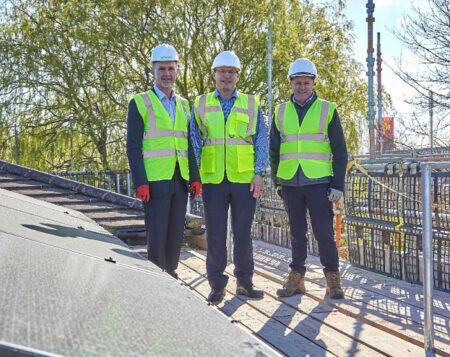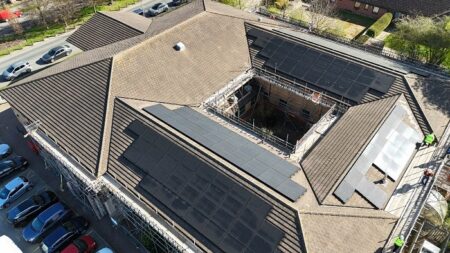Hull health centre reduces its carbon footprint

Representatives of the main partners involved in the project are photographed at the site where the photovoltaic panels are being fitted
Hull’s Marfleet Health Centre is set to become more sustainable as part of the NHS drive to net zero, with the installation of rooftop photovoltaic panels.
The upgrade is a joint project between Hull Citycare, which owns and manages the building, and Community Health Partnerships (CHP), which is the head tenant.
The centre was originally built in 2005 under the NHS LIFT programme, which aimed to transform health services across the country.
The building will have a number of modifications to reduce its carbon footprint, becoming the first LIFT health centre in Hull to have photovoltaic panels funded by Community Health Partnerships.
Citycare has created a digital model of the building, enabling them to test out ideas and create a decarbonisation plan.
The health centre is currently having 166 photovoltaic panels installed on the roof, which convert sunlight into electricity.
They will produce around 56,000 KWh of energy per year, enough for 62% of the health centre’s energy needs.
As well as providing an annual saving on energy bills of around £9,500, the panels will save 14 tonnes of CO2 a year, reducing the carbon footprint of the building.
Over the lifetime of the panels, that is equivalent to saving the carbon emissions of over 300 long-haul flights.
The installation of the photovoltaic panels is one of a number of measures which will reduce Marfleet Health Centre’s impact on the environment.
Over the last 18 months, the centre has also had all its 386 traditional light fixtures gradually replaced by LEDs, which use 25% less energy and last up to a decade, 10 times as long as a traditional fluorescent light bulb.
These have dramatically reduced the centre’s energy usage and made it one of the few LIFT health centres in the country to be fully lit with LEDs.

The panels will provide 56,000 KWh of energy per year, enough for 62% of the health centre’s energy needs
The centre is also set to have further work in the next year, with a plantroom upgrade and air conditioning replacement scheduled to take place.
And CHP is funding the installation of voltage optimisation to all 13 Hull LIFT health centres.
Tim Wigglesworth, chief executive of Hull Citycare, said: “With the NHS aiming to achieve net zero by 2040, it’s vital that everyone involved in healthcare has a robust plan to make their estate as sustainable and energy efficient as possible.
“We’re hoping this scheme will inspire other health centres across the country to look at their buildings and explore what modifications will help reduce their carbon footprints.”
Alan Land, head of technical services at CHP, added: “The installation of photovoltaic panels at Marfleet Health Centre in Hull is a tangible example of Community Health Partnerships’ commitment to driving sustainability across our estate.
“This project not only reduces the building’s carbon footprint and operational costs, but also directly supports the Greener NHS target to reach net zero before 2040.
“The team at CHP is working on initiatives across our portfolio, from energy-efficient upgrades to innovative renewable energy solutions, ensuring that our healthcare facilities contribute to a healthier environment for all.”
The six-week programme to fit the solar panels, which is being project managed by Sewell Facilities Management and fitted by local renewable energy specialist, N&P, will be completed by the middle of April, without disruption to health centre operations.
Once the project at Marfleet Health Centre is completed, the team will move on to fitting photovoltaic panels on two more buildings, Newington Health Centre in West Hull and Alexandra Health Centre in the Avenues area.
